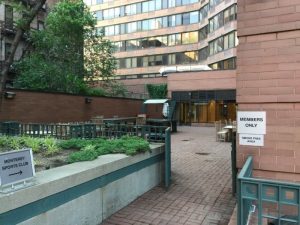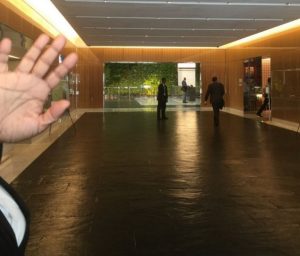Comptroller Stringer Audit: Public Denied Required Amenities at Public Spaces as City Enforcement Lags

Of 333 privately owned public spaces, 275 had not been inspected by the Department of Buildings in at least four years
More than half of privately owned public spaces failed to provide all required public amenities
Comptroller Stringer calls for an immediate top-to-bottom review of all POPS sites by the City
(New York, NY) – According to a new audit released by Comptroller Scott M. Stringer, developers and building owners – despite receiving generous zoning regulation exemptions that allow them to build taller and denser – are not providing the required public spaces and public amenities such as bike racks, seating, trees, and drinking fountains in line with their City agreements. The report found the Department of Buildings (DOB), the agency principally responsible for evaluating and ensuring compliance, hasn’t inspected most of these locations in years.
Privately owned public spaces – known as POPS – are outdoor or indoor spaces that are built for public use, for taxpayers’ benefit, by the developers of private buildings. In exchange for creating that public space, those developers are allowed to construct buildings higher and denser than would otherwise be allowed by applicable zoning regulations.
Currently, New York City property owners benefit from approximately 23 million square feet of additional zoning floor area in their buildings, in exchange for providing public space at 333 locations. Yet, the majority of property owners have been financially rewarded without fully meeting the obligations of their zoning agreements.
The Comptroller’s Office’s inspected all 333 New York City POPS locations as part of the audit, and found conditions at 182 of them – or 55 percent of the total – that violated requirements and had been largely ignored by DOB. Those violations include:
- Public access restricted by some type of fence, barricade or chain;
- Signs stating “For Private Use Only” despite locations’ being public space;
- A lack of required amenities (e.g., artwork, bicycle parking, drinking fountain, elevator, lighting, litter receptacles, planting, plaque/sign, seating, tables, trees, and a sufficient number of chairs); and
- Restaurants occupying portions of public space by placing tables and chairs for their private patrons to the exclusion of the public.
Even though the Department of Buildings is primarily responsible for ensuring compliance and issuing violations, the City has refused to proactively inspect POPS locations, instead opting for reviews only when individual complaints are received. That policy has allowed some violations to persist for years without any enforcement action by the City. In its response to the audit, DOB disagreed with the recommendation that it inspect all POPS location to ensure they are in existence, provide the required amenities to residents, and offer full public access as required to taxpayers.
- Of 333 POPS locations, 275 of them had not been inspected by DOB for at least four years, and when inspections did take place, they were often late, incomplete, or ineffective.
- Based on auditors’ observations of the 58 POPS locations that had been inspected by DOB in the prior four years, the Comptroller’s Office found that 41 (71 percent) were not in compliance with their City agreements.
- Yet, despite those 41 locations’ noncompliance, DOB issued only 18 violations to 10 of the locations.
- The Comptroller’s Office found that 34 of the 87 inspections that DOB conducted in the prior four years didn’t occur within 40 days of DOB’s receiving a complaint – the Department’s goal for such inspections.
“What’s happening is simply unbelievable. It’s egregious. New Yorkers are literally getting cheated out of tens of millions of dollars in public space – and the city is willfully choosing to do nothing about it. Public resources are effectively being given away at the expense of all of us. While there are many good actors who are meeting their requirements, where agreements are being violated, the Department of Buildings is refusing to provide effective enforcement. It’s unacceptable, and it has to change,” Comptroller Stringer said. “We have to be a city where everyone plays by the rules. That’s why today I’m calling on DOB to launch a top-to-bottom review of all of these locations and vigorously enforce the law when violations are found. If the City will only do inspections when it receives constituent complaints, then both as a New Yorker and as Comptroller, I want this audit to be considered a formal complaint about every location we found to be in violation of its agreement.”
The following photographs show some of the ways that the public is excluded from what are supposed to be public spaces.


Above are photos of a POPS location at 175 East 96th Street where public access was denied. This building was allowed an additional 68,157 square feet of floor area for creating a public space, but the public is not allowed in.
At 101 Barclay Street (below), the building owner benefits from increased height of the structure in exchange for a public lobby. Yet, the POPS is entirely closed to the public, and auditors who attempted to inspect the site were stopped, prevented from taking photographs, and escorted to the security office where they were questioned. Building security informed auditors that this lobby had been closed to the public for at least 15 years.

In addition, the auditors observed a notice prominently posted on the door that explicitly informs the public the space is for private use (below).

Coupled with the DOB, the New York City Department of City Planning (DCP) also oversees aspects of developers’ and owners’ compliance with their agreements. DOB enforces the City’s Building Code and Zoning Resolution and is responsible for issuing violation notices to owners when POPS are found to be out of compliance. These violations carry penalties of $4,000, and if a building owner defaults on a notice of violation, the penalty increases to $10,000. DCP is responsible for overseeing land use in New York City. DCP currently certifies POPS compliance with zoning regulations prior to the developer obtaining a foundation permit and conducts periodic compliance reviews for POPS created after 2007.
The Comptroller’s audit recommends a series of measures and reforms to ensure POPS are compliant with City zoning rules, including proactive inspections of all POPS locations, completion of a new, comprehensive database of all POPS locations, and referring the apparent destruction of a POPS location at one specific address to the City Law Department.
To read the full audit, click here.
###
###